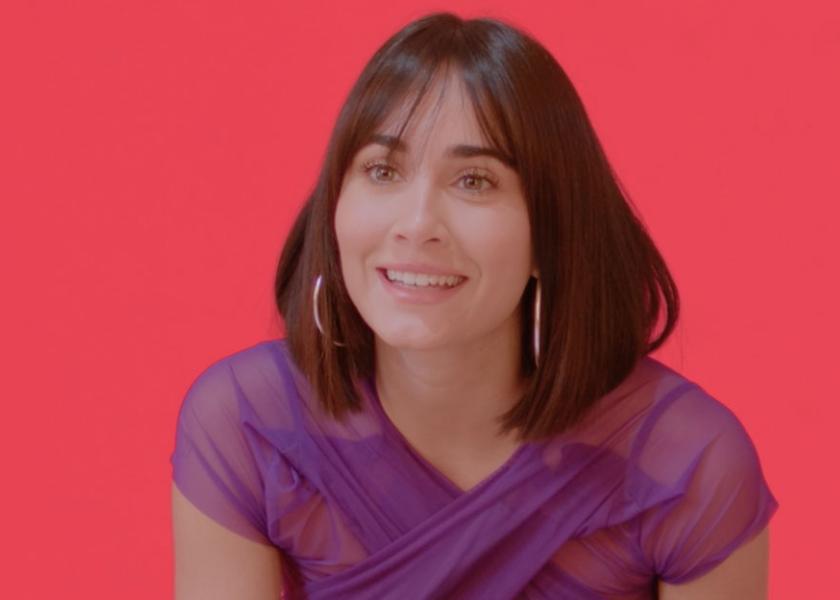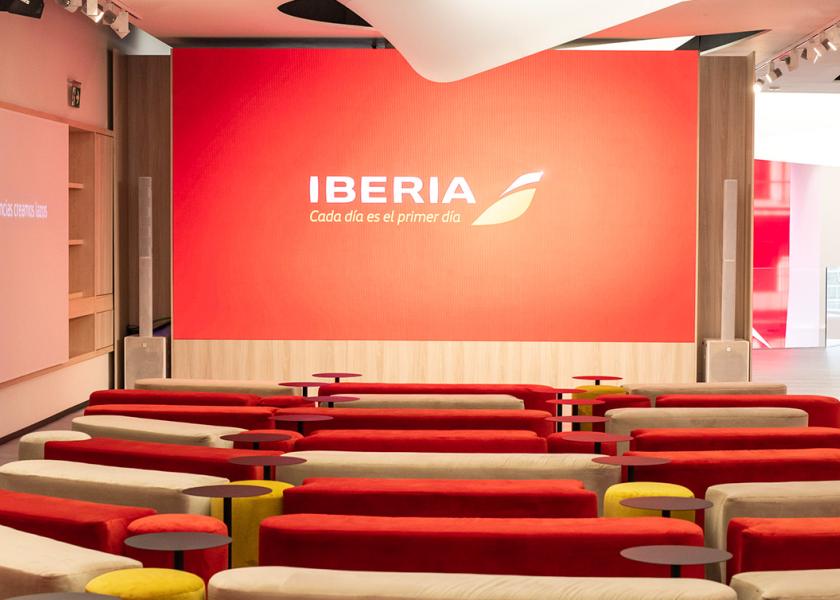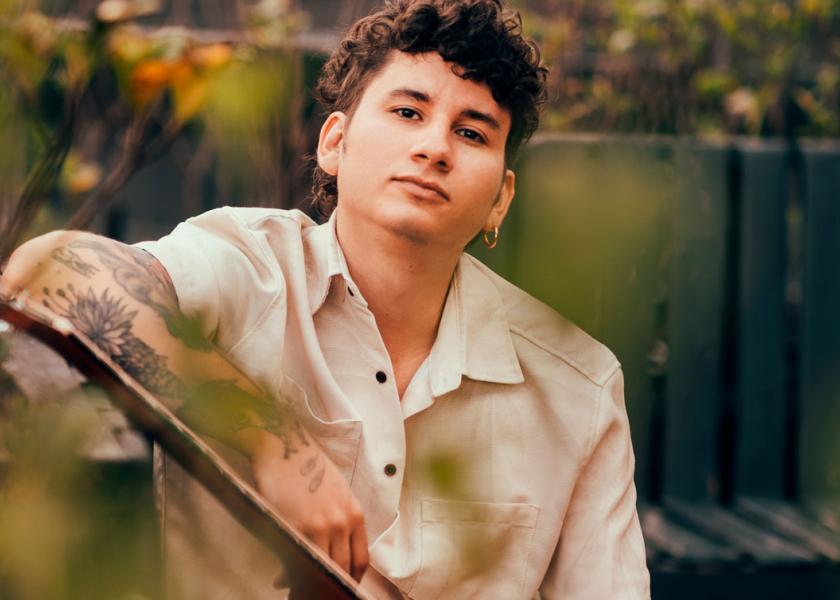Marina Tuset
Music without borders

On the 30th of May, Marina Tuset will play at Espacio Iberia Madrid, a unique opportunity to enjoy one of the most keyed up artists on the Spanish music scene live. And she will land with a Latin Grammy under her belt, which she received for her first album, ‘Canto a la imaginación’, for Best Engineered Album. A lover of boundless music, her show blends jazz, bossa nova and pop with freedom as her hallmark.
Marina Tuset (Sant Vicenç dels Horts, 1995) considers herself a citizen of the world and you can feel it in each of her arrangements. Listening to her first album (Canto a la imaginación, 2023), which unabashedly moves between soul, jazz, bossa nova and pop, is enough to confirm this. This album was recorded in the home studio of Brazilian musician and producer Érico Moreira, which, to Marina’s surprise, won the Latin Grammy for Best Engineered Album. Thanks to her close connection with Latin America, which has led her to collaborate with musicians such as Colombian Maréh or Dominican Vicente García, Marina has turned creative freedom into one of her distinguishing traits. On the 30th of May, after a mini tour of Colombia and Brazil, Marina will set her talent free at Espacio Iberia Madrid (Gran Vía, 48). “I’m really excited—this singer confesses— because I’m putting on a solo show with a few gadgets: an MPC, a keyboard, and a loop station. In a few days I’m leaving for Colombia and, when I return, I’ll use them for the first time in Spain at Espacio Iberia.”
You started studying music at the tender age of five. Did you always know?
Yes, I’ve always been sure. In fact, when I was three, I already sang the aria from The Queen of the Night from The Magic Flute. My parents really encouraged my brother, who is a flamenco guitarist, and I. Specifically, my father loves music and has a jazz club, as well as playing the sax as an amateur. I wanted to be a singer, but at the school near my village, they only did classical music, so I started studying classical piano. But I didn’t really get along with it and I sometimes used to hide the book, so I didn’t have to go to class (laughs). Everyone expected me to study a lot and learn the sheet music perfectly, but I’ve always been more about creating than reproducing.
Despite this, you didn’t stop studying. In fact, you’re a musician by training and you graduated with honours at the Berklee College of Music in Boston. What do you think that baggage brings to your music?
I believe we each have a different path in music and studying served me well, but I know other artists don’t need to because they are more self-taught. Going to Berklee, a very culturally diverse university, allowed me to share music with people from different parts of the world. I’ve made connections with other cultures and all that is reflected in my music, that’s why I wouldn’t know how to label it.
“I’ve made connections with other cultures and all that is reflected in my music, that’s why I wouldn’t know how to label it”
Your first album, Canto a la imaginación, defends that innocent but also adventurous gaze we have when we’re little and that we leave behind as we grow up. Why did you want to bring it back?
There was a time in my life when I was really overwhelmed, I felt that I’d lost that spontaneity, that childlike essence of always daydreaming. I felt the need to restore that freedom and I understood that freedom is what’s important. In fact, Albert Einstein used to say: “Imagination is everything. It is the preview of life’s coming attractions.”
The album unabashedly moves between genres like soul, jazz, bossa nova, and pop. How does a Catalan musician end up incorporating such distinctive styles?
I’m Catalan, but I’m a citizen of the world. Wherever I go I like to fit in, share, and learn. I love music beyond genres. I’m inspired by many cultures and pour that into my music, but I do it without thinking, it comes naturally to me

Marina Tuset’s first album, ‘Canto a la imaginación’, won the Latin Grammy for Best Engineered Album. © Mafe Espitia
Your music bets on fusion and holds Latin America in view. How much inspiration do you find across the pond?
I feel connected to Latin America and its culture. I haven’t been there much physically, because I only know Brazil and the Dominican Republic, although soon I’ll be playing in Colombia for the first time [Cali, 17th of May; and Bogotá, 25th of May], but I have spiritually thanks to the Latin Americans I met while living in Boston and New York. There’s something about that place, a kind of energy, which inspires me.
Life, and a music career in particular, is built on connections. Which has been essential for you?
At each moment in life, there are important people. Now I’d say Érico Moreira, but I also remember David Sanz, one of my piano teachers, a lot. When I was 12, I started taking lessons with him and when he heard me sing, he invited me to jam at the Jazzsí Club in Barcelona. I used to go every Sunday to sing with professional musicians and that gave me a lot of experience. I couldn’t go in because of my age, so I’d stay behind the bar until it was my turn to sing (laughs). It also opened doors for me, and I started to play with La Locomotora Negra, a very important big jazz band.
“I spent some time without publishing music and sometimes you lose hope because everyone releases songs and, if you don’t, you’re no one”
Actually, the music industry pushes artists to constantly publish music. You, however, worked on Canto a la imaginación for four years. Do you resist following that pace?
I built the album slowly and over those four years I went through several processes, including the quarantine due to the pandemic, a time that allowed me to find myself. I used that time to publish videos on social media that worked really well and put the album aside for a while, but that impasse allowed me to understand how I wanted the album to sound both in terms of arrangement and production. I spent some time without publishing music and sometimes you lose hope because everyone releases songs and, if you don’t, you’re no one.
Few artists can brag about their debut album winning a Latin Grammy. Do you feel it’s an endorsement of your career?
Seeing how so much work and energy were rewarded with such an important award has been incredible. It’s encouraging because it’s like they’re telling you you’re on the right track. Life as an independent artist is hard because you have to be creating music, but also content, all the time, and you don’t have so much support, I do everything myself.
“Each person has different talents, something that makes them stand out, where they shine. It’s like having your own voice, you have something to say”
Specifically, you received the Latin Grammy for Best Engineered Album for an album created in your producer Érico Moreira’s bedroom. Is this proof that, in the end, talent prevails above everything else?
Yes, absolutely. Talent is the only thing you really need. Now you can record an album at a superstudio, and it might not sound as good as one recorded at a home studio, which is what we had. But Érico is really good at mixing and Felipe Tichauer, who mastered the album, is also a pro. Felipe has a studio in Miami and it was through him that we had access to the Latin Grammy. We ended up there without knowing anyone in that industry, so it was a huge surprise.
Speaking of talent, what does that word mean to you?
I think that each person has different talents, something that makes them stand out, where they shine. It’s like having your own voice, you have something to say. I believe talent is innate, but it’s also something that happens because you can make it grow. Normally you feel like you want to develop talent that is already budding.


